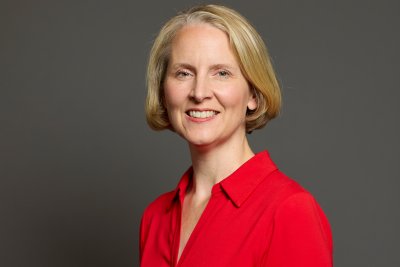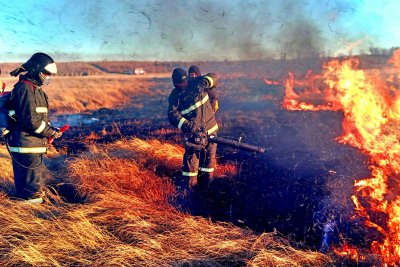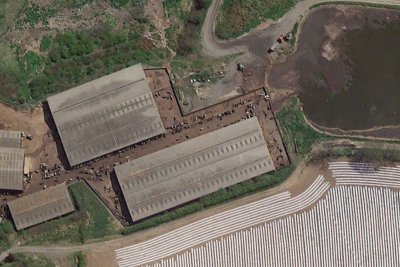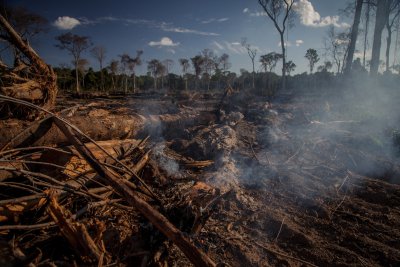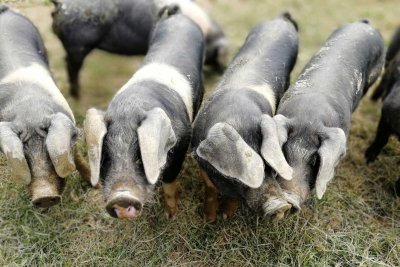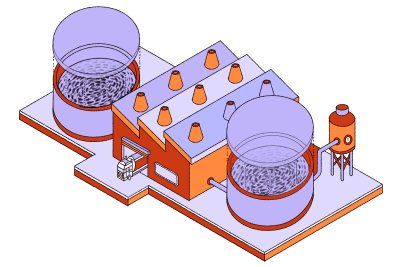 Aerial drone shot of three mega-farm sheds. Copyright: AGtivist
Aerial drone shot of three mega-farm sheds. Copyright: AGtivist
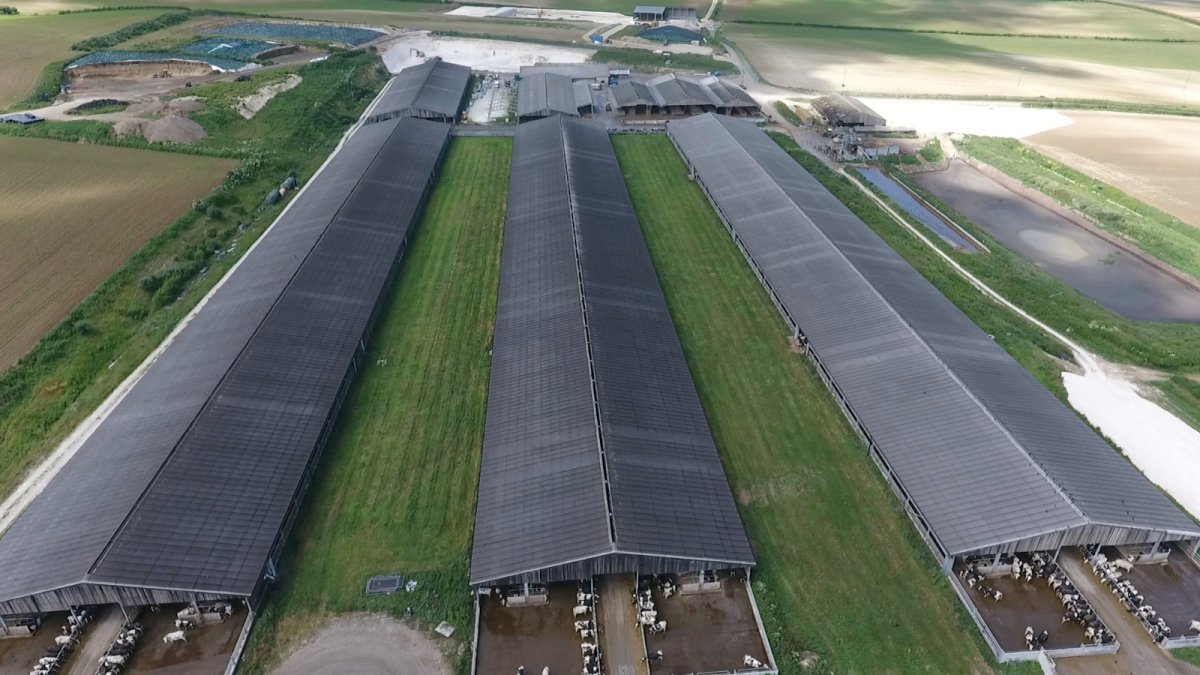
Shocking scale of UK megafarms exposed as court hearing may accelerate end of factory farming
New images of the UK’s 30 largest livestock megafarms – dubbed the Dirty Thirty by environmental campaigners – have been revealed for the first time, showing how these facilities have rapidly expanded across the country.
The 30 factory farms, shown using drone footage and satellite images, have capacity for more than 11 million chickens and 145,000 pigs at a time, as well as for intensively rearing at least 25,000 cattle a year, according to government agency data.
Since 2017, the overall number of intensive livestock units in the UK has increased by a fifth (21%). It is estimated that just ten large agribusinesses control the majority of these facilities, marking a shocking shift towards the industrialisation and automation of animal farming in the UK, which is estimated to have cost 14,000 jobs in farming nationwide.
These new images showing the shocking scale of UK megafarms come as a series of key legal rulings mean that new intensive livestock units can be rejected on pollution and environmental grounds.
Earlier this month, King’s Lynn and West Norfolk Borough Council unanimously rejected a planning application for a new industrial megafarm in the county. Charities Feedback Global and Sustain – who have released the images obtained by the investigative group AGtivist – say this landmark decision marks the end of new factory farms in the UK and that an effective moratorium starts now.
Legal advice obtained by Feedback and Sustain was critical to the Norfolk decision: it indicated that the precedent set by a Supreme Court ruling in 2024 regarding a Surrey oil well (the 'Finch' ruling) is also applicable to industrial livestock farms – meaning the full climate impact must be taken into account when deciding whether to grant planning permission.
In the case of factory farming, this includes emissions caused by the cultivation of feed crops such as soy, which give rise to substantial climate emissions. On decision day in Norfolk, the council's barrister also took this view, highlighting the strong likelihood of judicial review if the application were approved.
Another landmark case could soon give councils more power to protect rivers from pollution from factory farms. On 30 April 2025, River Action commenced its case against Shropshire County Council at the High Court in Cardiff for its failure to consider the cumulative environmental impact of pollution caused by other intensive livestock farms in its decision to grant permission to another large chicken facility north-west of Shrewsbury at Felton Butler. The case was brought by Dr Alison Caffyn and River Action.
Natasha Hurley, campaigns director at Feedback Global, said:
These shocking images of the UK’s biggest factory farms – which we’re calling the dirty thirty – show for the first time the sheer scale of industrial US-style megafarms in the UK. These huge, environment-wrecking factory farms are categorically not the way to rear livestock or feed people. That’s why King’s Lynn and West Norfolk Borough Council’s landmark rejection of a new megafarm on environmental grounds is so game-changing and why it must spell the immediate end of factory farming expansion in this country.
Ruth Westcott, campaign manager at Sustain, said:
We have the power, and now the legal backing, to stop the spread of factory farming. Thanks to the action of communities and councils up and down the country, the era of megafarms dominating our countryside is over. It’s time to build a food system that puts people, planet, and farmers first.
According to Compassion in World Farming, there are now nearly 1,200 megafarms operating across the UK overall, up from 976 in 2016. They estimate that around 85% of farm animals – over one billion animals – are kept in factory farms per year.
The expansion of factory farms across the length and breadth of the nation is part of a wider trend of intensification that’s swept the UK’s meat and dairy sectors and is estimated to have cost 14,000 jobs in farming as the industry is increasingly dominated by a handful of agribusinesses, and farming jobs are replaced by automation. The shift raises fundamental questions about the way food is farmed and produced. Investing in the growth of the UK fruit and vegetable sector could add £0.5bn to UK GDP per year, whilst the growth of the livestock industry is identified as a risk to food security, owing largely to the amount of land required to produce feed.
Earlier this year, Feedback Global and Sustain revealed how intensive poultry and pig farms across East Anglia have violated environmental regulations almost 800 times since 2017, according to inspection and enforcement reports obtained by AGtivist following Freedom of Information requests to the Environment Agency.
Some of the megafarms have faced allegations over animal cruelty or poor welfare standards, while others have been linked to water and air pollution. The firms behind some of the megafarms have also been implicated in the spread of potentially harmful diseases, including salmonella and campylobacter, which can travel via contaminated meat or eggs.
With mounting concern over the poor state of Britain's rivers, the quality of our air, as well as fears around avian flu, antibiotic resistance, and the wider impacts on conventional farmers and the countryside, industrial farming is coming under scrutiny as never before. Legal rulings are giving local democratic institutions more power, and campaigners are confident that this switch could spell the end of the shocking expansion trend of intensive livestock units.
Sustain: Sustain The alliance for better food and farming advocates food and agriculture policies and practices that enhance the health and welfare of people and animals, improve the working and living environment, enrich society and culture and promote equity.
Sustain
The Green House
244-254 Cambridge Heath Road
London E2 9DA
020 3559 6777
sustain@sustainweb.org
Sustain advocates food and agriculture policies and practices that enhance the health and welfare of people and animals, improve the working and living environment, promote equity and enrich society and culture.
© Sustain 2026
Registered charity (no. 1018643)
Data privacy & cookies
Icons by Icons8
